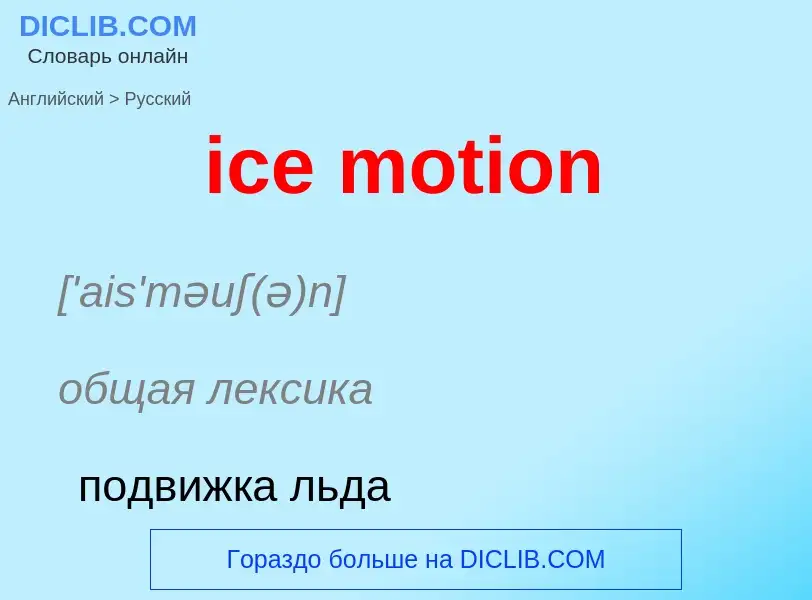Перевод и анализ слов искусственным интеллектом ChatGPT
На этой странице Вы можете получить подробный анализ слова или словосочетания, произведенный с помощью лучшей на сегодняшний день технологии искусственного интеллекта:
- как употребляется слово
- частота употребления
- используется оно чаще в устной или письменной речи
- варианты перевода слова
- примеры употребления (несколько фраз с переводом)
- этимология
ice motion - перевод на русский
['ais'məuʃ(ə)n]
общая лексика
подвижка льда
ледоход
['dilət(ə)ri]
прилагательное
общая лексика
оттягивающий
отсрочивающий
запоздалый
книжное выражение
медленный
медлительный
нерасторопный (о человеке)
синоним
строительное дело
припай, неподвижный лёд
строительное дело
автозимник
география
лед глетчерный
лед монолитный
общая лексика
образование льда
обледенение
строительное дело
льдообразование (в грунтах)
Определение
1) Соотносящийся по знач. с сущ.: кукла (1*1), связанный с ним.
2) а) Свойственный кукле (1*1), характерный для нее.
б) перен. разг. Невыразительный, безжизненный.
3) перен. разг. Маленький - меньше обычного - нормального размера.
Википедия
The Francœur Motion, introduced in the Legislative Assembly of Quebec in 1918 by Liberal MLA Joseph-Napoléon Francœur, declared that Quebec would be prepared to leave the Canadian federation if English Canadians felt the presence of Quebec was "an obstacle to the union, progress and development of Canada".
Que cette Chambre est d’avis que la Province de Québec serait disposée à accepter la rupture du pacte confédératif, si dans les autres provinces, on croit qu’elle est un obstacle à l’union, au progrès et au développement du Canada.
(That this House is of the opinion that the Province of Quebec would be prepared to accept the break-up of the Confederation Pact if, in the other provinces, it is believed to be an obstacle to the union, progress and development of Canada.)
Francœur's motion was a response to the harsh reaction in English Canada to Quebec's strong anti-conscription feelings during the Conscription Crisis of 1917 of the First World War. Many Quebecers opposed conscription because of anti-imperialist sentiments. The motion attracted widespread attention in the press and was notably approved by the newspaper Le Canada. Premier of Quebec Lomer Gouin finally convinced Francœur to withdraw the motion because he did not wish to see a vote taken on it.

.jpg?width=200)


![SnowCastle]] [[ice hotel]] in [[Finland]] SnowCastle]] [[ice hotel]] in [[Finland]]](https://commons.wikimedia.org/wiki/Special:FilePath/Castello di neve in lapponia 02 (2108559776).jpg?width=200)
![Feather ice on the plateau near [[Alta, Norway]]. The crystals form at temperatures below −30 °C (−22 °F). Feather ice on the plateau near [[Alta, Norway]]. The crystals form at temperatures below −30 °C (−22 °F).](https://commons.wikimedia.org/wiki/Special:FilePath/Feather ice 1, Alta plateau, Norway.jpg?width=200)
![Channel through ice for ship traffic on [[Lake Huron]] with [[ice breaker]]s in background Channel through ice for ship traffic on [[Lake Huron]] with [[ice breaker]]s in background](https://commons.wikimedia.org/wiki/Special:FilePath/Frozen Lake Huron- icebreakers and commercial vessels.jpg?width=200)

![Harvesting ice on [[Lake St. Clair]] in [[Michigan]], c. 1905 Harvesting ice on [[Lake St. Clair]] in [[Michigan]], c. 1905](https://commons.wikimedia.org/wiki/Special:FilePath/Ice Harvesting on Lake St Clair Michigan circa 1905--photograph courtesy Detroit Publishing Company.jpg?width=200)

![Ice on deciduous tree after [[freezing rain]] Ice on deciduous tree after [[freezing rain]]](https://commons.wikimedia.org/wiki/Special:FilePath/Icy Japanese Maple branch, Boxborough, Massachusetts, 2008.jpg?width=200)

![''Skating fun'' by 17th century Dutch painter [[Hendrick Avercamp]] ''Skating fun'' by 17th century Dutch painter [[Hendrick Avercamp]]](https://commons.wikimedia.org/wiki/Special:FilePath/SCENEONICE.jpg?width=200)
![Loss of control on ice by an [[articulated bus]] Loss of control on ice by an [[articulated bus]]](https://commons.wikimedia.org/wiki/Special:FilePath/Scania articulated bus on icy road.jpg?width=200)

![[[Snowflake]]s by [[Wilson Bentley]], 1902. [[Snowflake]]s by [[Wilson Bentley]], 1902.](https://commons.wikimedia.org/wiki/Special:FilePath/SnowflakesWilsonBentley.jpg?width=200)
![black pneumatic boot]]. black pneumatic boot]].](https://commons.wikimedia.org/wiki/Special:FilePath/Some Ice on the boots (1527659244).jpg?width=200)
![Ice pier during 1983 cargo operations. [[McMurdo Station]], Antarctica Ice pier during 1983 cargo operations. [[McMurdo Station]], Antarctica](https://commons.wikimedia.org/wiki/Special:FilePath/USNS Southern Cross at the ice pier in 1983.jpg?width=200)
